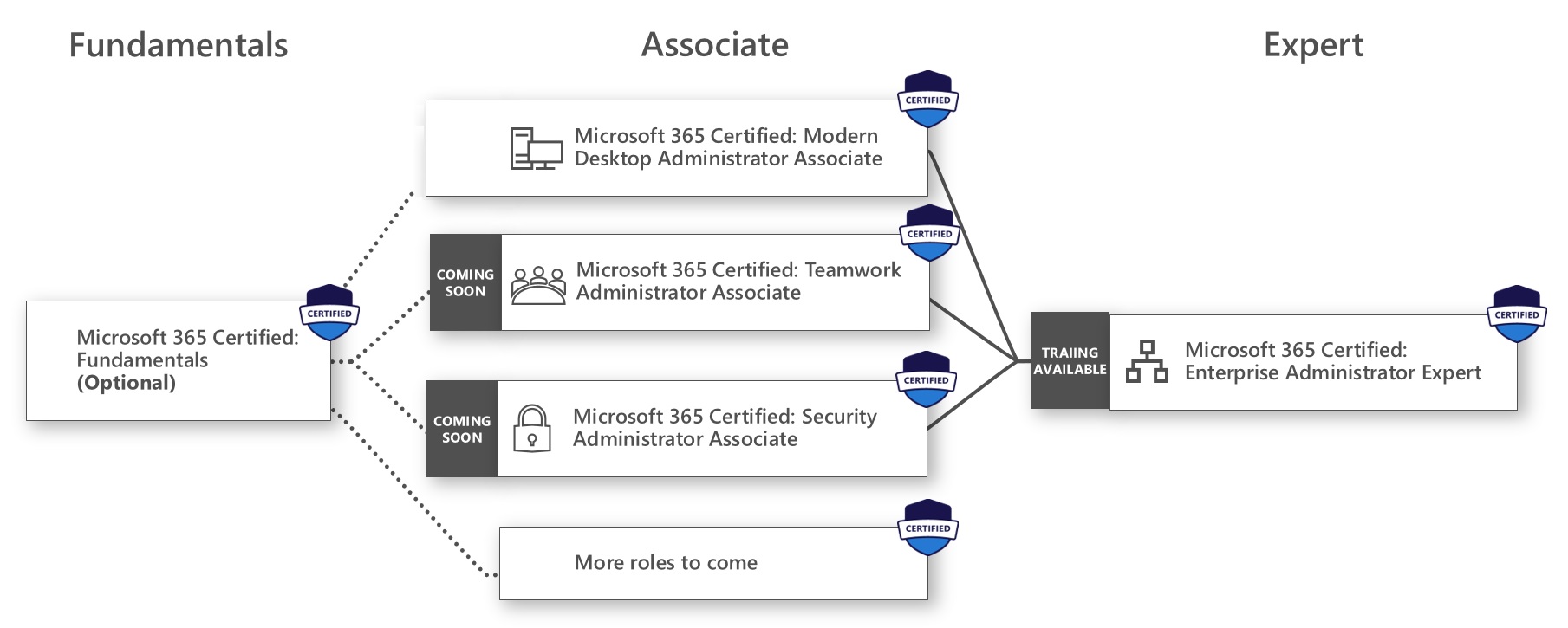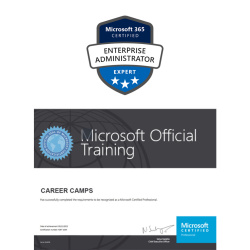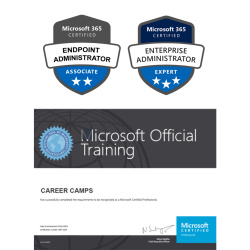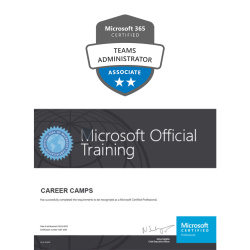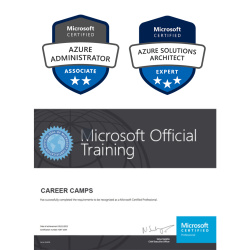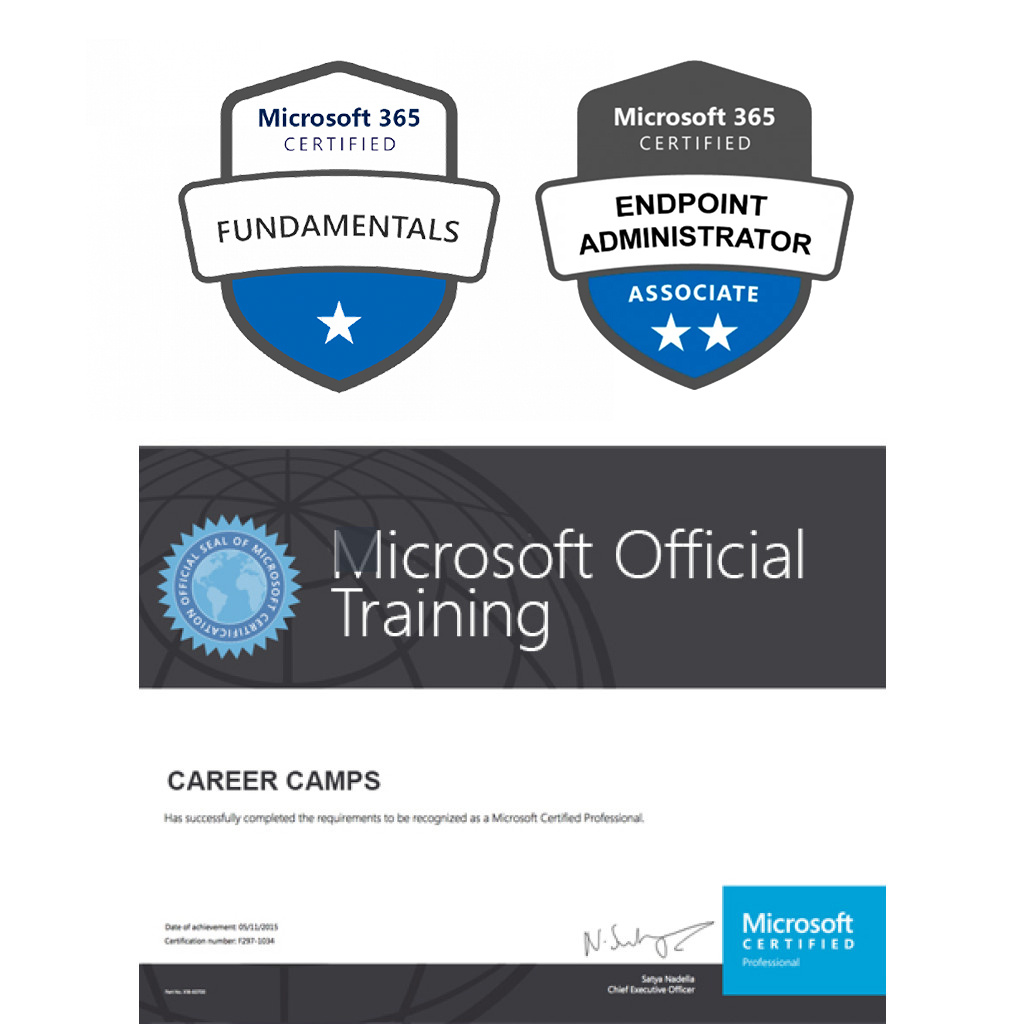
MCA Microsoft 365 Endpoint Administrator Associate w/Microsoft 365 Foundations Certification Camp (2 Courses 2 Exams 2 Certifications)
$3,495.00
The Career Camps MCA Microsoft 365 Endpoint Admin with Foundations offers a comprehensive, end-to-end approach to deploying, configuring, securing, managing, and monitoring services, devices, and client applications within a Microsoft 365 environment. During this 5-day boot camp, students will prepare for and take the official MD-102 Endpoint Administrator exam to earn the MCA Endpoint Administrator Associate certification. We also offer the MCE Microsoft 365 Administrator Expert w/MCA Microsoft 365 Endpoint Administrator Accelerated COMBO Certification Camp and the MCE Microsoft 365 Administrator Expert Certification Camp.
EXAMS INCLUDED
MS-900: Microsoft 365 Fundamentals
MD-102: Endpoint Administrator
WHAT IS INCLUDED
| Airfare to/from Sarasota, FL | |
| 5 Nights of Lodging | |
| Ground Transportation | |
| Microsoft Training Books | |
| 2 Microsoft Exam Vouchers | |
| 1 Retake Voucher (per exam, if needed) | |
| Onsite Pearson Vue Test Center | |
| Microsoft Study Labs & Simulations |
LOCATIONS
Career Camps primary Microsoft Training campus (for individual students) is located in Sarasota, FL. Can’t travel to our facility? No problem! You will save on airfare, lodging and transportation. Just contact us and we will get you pricing to attend the class online live virtually from your work or home. If you do not see the location or class you are looking for, let us know! We have access to hundreds of classes and locations all across the United States and also offer corporate and group rates. If you have 5 students or more we can even come to you! With several partnerships in place, we are sure to have something to fit your needs. Whether you need to get MCA or MCE Certified, or get updated on Microsoft Windows Server 2022, we’ve got you covered.
Description
Career Camps offers the exclusive Microsoft Official MCA Microsoft 365 Endpoint Admin with Foundations, providing a complete end-to-end training and certification solution. During this boot camp, students will gain hands-on experience in deploying, configuring, securing, managing, and monitoring services, devices, and client applications within a Microsoft 365 environment. They will learn how to manage identity, security, access, policies, updates, and apps for endpoints. The training also covers the implementation and management of endpoints using tools such as Microsoft Intune, Windows 365, Windows Autopilot, Microsoft Defender for Endpoint, and Azure Active Directory (Azure AD), part of Microsoft Entra.
The Microsoft 365 Certified MCA boot camp is taught using Microsoft Official Courseware –
MS-900T01: Microsoft 365 Foundations
MD-102T00: Microsoft 365 Endpoint Administrator
Skills Gained:
Deploy Windows client
Manage identity and compliance
Manage, maintain, and protect devices
Manage applications
Describe cloud concepts
Describe Microsoft 365 apps and services
Describe security, compliance, privacy, and trust in Microsoft 365
Describe Microsoft 365 pricing, licensing, and support
Topics Covered in this Official Boot Camp:
Explore the Enterprise Desktop
Describe the benefits of Modern Management.
Explain the enterprise desktop life-cycle model.
Describe considerations for planning hardware strategies.
Describe considerations for post-deployment and retirement.
Examine benefits of modern management
Examine the enterprise desktop life-cycle model
Examine planning and purchasing
Examine desktop deployment
Plan an application deployment
Plan for upgrades and retirement
Explore Windows Editions
Explain the differences between the different editions of Windows.
Select the most suitable Windows device for your needs.
Describe the minimum recommended hardware requirements for installing Windows 11.
Examine windows client editions and capabilities
Select client edition
Examine hardware requirements
Understand Microsoft Entra ID
Describe Microsoft Entra ID.
Compare Microsoft Entra ID to Active Directory Domain Services (AD DS).
Describe how Microsoft Entra ID is used as a directory for cloud apps.
Describe Microsoft Entra ID P1 and P2.
Describe Microsoft Entra Domain Services.
Examine Microsoft Entra ID
Compare Microsoft Entra ID and Active Directory Domain Services
Examine Microsoft Entra ID as a directory service for cloud apps
Compare Microsoft Entra ID P1 and P2 plans
Examine Microsoft Entra Domain Services
Manage Microsoft Entra identities
Describe RBAC and use roles in Microsoft Entra ID
Create and manage users in Microsoft Entra ID
Create and manager groups in Microsoft Entra ID
Use Windows PowerShell cmdlets to manager Micrososft Entra ID
Describe how you can synchronize objects from AD DS to Microsoft Entra ID
Examine RBAC and user roles in Microsoft Entra ID
Create and manage users in Microsoft Entra ID
Create and manager groups in Microsoft Entra ID
Manager Microsoft Entra objects with Microsoft Graph PowerShell
Synchronize objects from AD DS to Microsoft Entra ID
Manage device authentication
Describe Microsoft Entra join
Describe Microsoft Entra join prerequisites, limiatations, and benefits
Join device to Microsoft Entra ID
Manager devices joined to Microsoft Entra ID
Describe Microsoft Entra join
Examine Microsoft Entra join prerequisites limitations and benefits
Join devices to Microsoft Entra ID
Manager devices joined to Microsoft Entra ID
Enroll devices using MIcrosoft Configuration Manager
Describe Microsoft Endpoint Manager
Understand the advantages of managing a client with Configuration Manager
Deploy the Configuration Manager client
Monitor the Configuration Manager Client
Manager Configuration Manager devices
Deploy the Microsoft Configuration Manager client
Monitor the Microsoft Configuration Manager client
Manage the Microsoft Configuration Manager client
Enroll devices using Microsoft Intune
Prepare Microsoft Intune for device enrollment
Configure Micrososft Intune for automatic enrollment
Explain how to enroll Windows, Android and iOS devices in Intune
Explain when and how to use Intune Enrollment Manager
Understand how to monitor and perform remote actions on enrolled devices
Manage mobile device with Intune
Enable mobile device manager
Explain considerations for device enrollment
Manage corporate enrollment policy
Enroll Windows devices in Intune
Enroll Android devices in Intune
Enroll iOS devices in Intune
Explore device enrollment manager
Monitor device enrollment
Manage devices remotely
Execute device profiles
Describe the various types of device profiles in Intune
Explain the difference between built-in and custom profiles
Create and manage profiles
Explore Intune device profiles
Create device profiles
Create a custom device profile
Oversee device profiles
Monitor the assignments of profiles
Understand how profiles are synchronized and how to manually force synchronization
Use PowerShell to execute and monitor scripts on devices
Monitor device profiles in Intune
Manage device sync in Intune
Manage devices in Intune using scripts
Maintain User Profiles
Explain the various user profile types that exist in Windows
Describe how a user profile works
Configure user profiles to conserve space
Explain how to deploy and configure Folder Redirection
Explain Enterprise State Roaming
Configure Enterprise State Roaming for Azure AD device
Examine user profile
Explore user profile types
Examine options for minimizing user profile size
Deploy and configure folder redirection
Sync user state with Enterprise State Roaming
Configure Enterprise State Roaming in Azure
Execute mobile application management
Explain Mobile Application Management.
Understand application considerations in MAM.
Explain how to use Configuration Manager for MAM.
Use Intune for MAM.
Implement and manage MAM policies.
Examine mobile application management
Examine considerations for mobile application management
Prepare line-of-business apps for app protection policies
Implement mobile application management policies in Intune
Manage mobile application management policies in Intune
Deploy and update applications
Explain how to deploy applications using Intune and Configuration Manager
Learn how to deploy applications using Group Policy
Understand Microsoft Store Apps
Learn how to deply apps using Microsoft Store Apps
Learn how to configure Microsoft Store Apps
Deploy applications with Intune
Add apps to Intune
Manage Win32 apps with Intune
Deploy applications with Configuration Manager
Deploying applications with Group Policy
Assign and publish software
Explore Microsoft Store for Business
Implement Microsoft Apps
Update Microsoft Store Apps with Intune
Assign apps to company employees
Administer endpoint applications
Explain how to manage apps in Intune.
Understand how to manage apps on nonenrolled devices.
Understand how to deploy Microsoft 365 Apps using Intune.
Learn how to configure and manage IE mode in Microsoft Edge.
Learn about app inventory options in Intune.
Manage apps with Intune
Manage apps on non-enrolled devices
Deploy Microsoft 365 Apps with Intune
Additional Microsoft 365 Apps Deployment Tools
Configure Microsoft Edge Internet Explorer mode
App Inventory Review
Protect identities in Microsoft Entra ID
Describe Windows Hello for Business
Describe Windows Hello deployment and management
Describe Microsoft Entra ID Protection
Describe and manage self-service password reset in Microsoft Entra ID
Describe and manage multi-factor authentication
Explore Windows Hello for Business
Deploy Windows Hello
Manage Windows Hellos for Business
Explore Microsoft Entra ID Protection
Manage self-service password reset in Microsoft Entra ID
Implement multi-factor authentication
Enable organizational access
Describe how you can access corporate resources
Describe VPN types and configuration
Describe Always On VPN
Describe how to configure Always On VPN
Enable access to organization resources
Explore VPN types and configuration
Explore Always on VPN
Deploy Always on VPN
Implement device compliance
Describe device compliance policy
Deploy a device compliance policy
Describe conditional access
Create conditional access policies
Protect access to resources using Intune
Explore device compliance policy
Deploy a device compliance policy
Explore conditional access
Create conditional access policies
Generate inventory and compliance
Generate inventory reports and Compliance reports using Microsoft Intune
Report and monitor device compliance
Create custom reports using the Intune Data Warehouse
Use the Microsoft Graph API for building custom reports
Report enrolled devices inventory in Intune
Monitor and report device compliance
Build custom Intune inventory reports
Access Intune using Microsoft Graph API
Deploy device data protection
Describe Windows Information Protection
Plan for Windows Information Protection usage
Implement and use Windows Information Protection
Describe the Encrypting File System (EFS)
Describe BitLocker
Explore Windows Information Protection
Plan Windows Information Protection
Implement and use Windows Information Protection
Explore Encrypting File System in Windows client
Explore BitLocker
Manage Microsoft Defender for Endpoint
Describe Microsoft Defender for Endpoint
Describe key capabilities of Microsoft Defender for Endpoint
Describe Microsoft Defender Application Guard
Describe Microsoft Defender Exploit Guard
Describe Windows Defender System Guard
Explore Microsoft Defender for Endpoint
Examine key capabilities of Microsoft Defender for Endpoint
Explore Windows Defender Application Control and Device Guard
Explore Microsoft Defender Application Guard
Examine Windows Defender Exploit Guard
Explore Windows Defender System Guard
Manage Microsoft Defender in Windows Client
Describe Windows Security capabilities
Describe Windows Defender Credential Guard
Manage Microsoft Defender Antivirus
Manage Windows Defender Firewall
Manage Windows Defender Firewall with Advanced Security
Explore Windows Security Center
Explore Windows Defender Credential Guard
Manage Microsoft Defender Antivirus
Manage Windows Defender Firewall
Explore Windows Defender Firewall with Advanced Security
Manage Microsoft Defender for Cloud Apps
Describe Microsoft Defender for Cloud Apps
Plan for Microsoft Defender for Cloud Apps usage
Implement and use Microsoft Defender for Cloud Apps
Explore Microsoft Defender for Cloud Apps
Planning Microsoft Defender for Cloud Apps
Implement Microsoft Defender for Cloud Apps
Assess deployment readiness
Describe the guidelines for an effective enterprise desktop deployment
Explain how to assess the current environment
Describe the tools that you can use to assess your current environment
Describe the methods of identifying and mitigating application compatibility issues
Explain considerations for planning a phased rollout
Examine deployment guidelines
Explore readiness tools
Assess application compatibility
Explore tools for application compatibility mitigation
Prepare network and directory for deployment
Plan a pilot
Deploy using the Microsoft Deployment Toolkit
Describe the fundamentals of using images in traditional deployment methods.
Describe the key benefits, limitations, and decisions when planning a deployment of – Windows using Microsoft Deployment Toolkit (MDT).
Describe how Configuration Manager builds upon MDT and how both can work in harmony.
Explain the different options and considerations when choosing the user interaction experience during deployment, and which methods and tools support these experiences.
Evaluate traditional deployment methods
Set up the Microsoft Deployment Toolkit for client deployment
Manage and deploy images using the Microsoft Deployment Toolkit
Deploy using Microsoft Configuration Manager
Describe the capabilities of Configuration Manager.
Describe the key components of Configuration Manager.
Describe how to troubleshoot Configuration Manager deployments.
Explore client deployment using Configuration Manager
Examine deployment components of Configuration Manager
Manage client deployment using Configuration Manager
Plan in place upgrades using Configuration Manager
Deploy Devices using Windows Autopilot
Explain the benefits of modern deployment for new devices.
Describe the process of preparing for an Autopilot deployment.
Describe the process of registering devices in Autopilot.
Describe the different methods and scenarios of Autopilot deployments.
Describe how to troubleshoot common Autopilot issues.
Describe the process of deployment using traditional methods.
Use Autopilot for modern deployment
Examine requirements for Windows Autopilot
Prepare device IDs for Autopilot
Implement device registration and out of the box customization
Examine Autopilot scenarios
Troubleshoot Windows Autopilot
Implement dynamic deployment methods
Describe how Subscription Activation works.
Describe the benefits of Provisioning Packages.
Explain how Windows Configuration Designer creates Provisioning Packages.
Describe the benefits of using MDM enrollment with Microsoft Entra join.
Examine subscription activation
Deploy using provisioning packages
Use Windows Configuration Designer
Use Microsoft Entra join with automatic MDM enrollment
Plan a transition to modern endpoint management
Identify usage scenarios for Microsoft Entra join.
Identify workloads that you can transition to Intune.
Identify prerequisites for co-management.
Identify considerations for transitioning to modern management.
Plan a transition to modern management using existing technologies.
Plan a transition to modern management using Microsoft Intune.
Explore using co-management to transition to modern endpoint management
Examine prerequisites for co-management
Evaluate modern Management considerations
Evaluate upgrades and migrations in modern transitioning
Migrate data when modern transitioning
Migrate workloads when modern transitioning
Manage Windows 365
Describe the key features of Windows 365.
Describe the Windows 365 management experience.
Describe the Windows 365 security model.
Describe the Windows 365 deployment options.
Describe the Windows 365 licensing model.
Explore Windows 365
Configure Windows 365
Administer Windows 365
Manage Azure Virtual Desktop
Describe the key features of Azure Virtual Desktop
Describe the Azure Virtual Desktop management experience
Describe the Azure Virtual Desktop security model
Describe the Azure Virtual Desktop deployment options
Examine Azure Virtual Desktop
Explore Azure Virtual Desktop
Configure Azure Virtual Desktop
Administer Azure Virtual Desktop
Additional information
| Class Dates | 12/01/2025 – 12/05/2025 – Sarasota, FL, 01/05/2026 – 01/09/2026 – Sarasota, FL, 02/02/2026 – 02/06/2026 – Sarasota, FL, 03/02/2026 – 03/06/2026 – Sarasota, FL, 04/06/2026 – 04/10/2026 – Sarasota, FL, 05/04/2026 – 05/08/2026 – Sarasota, FL |
|---|
Our Facilities
CAREER CAMPS FACILITIES

CLASSROOM EQUIPMENT – Students work on a dedicated Dell Client Desktop with 32GB memory with 512GB SSD drives – All Labs are executed the extremely fast Microsoft Data Center Hosted Lab Environment.
CAMPUS INTERNET – The campus is connected with a 1Gbps (1,000 Mbps) Verizon Fios Business Connection which provides complete internet (including VPN) access for students.
COMMON AREA – Amenities including snacks, drinks (Coffee, 100% juices, sodas, etc) all complimentary.
LODGING – We use the Hyatt Place Lakewood Ranch. This “upgraded” hotel offers extremely comfortable beds, great breakfast and very fast internet access.
NEAR BY AMENITIES – Many shops, restaurants and grocery options are available within walking distance. Additionally – the hotel provided scheduled shuttle services. Restaurants like Bone Fish Grill, Ruby Tuesday’s, Five Guys, Chipotle, Quiznos, Chili’s and over 20 additional choices in the immediate area. All of these options are offered in a pedestrian walking village.
Why Choose Us
CAREER CAMPS DIFFERENCE
Career Camps provides an in-depth hands on learning environment. Our instructors teach using demonstrations and explain concepts beyond the scope of the courseware. The best instructors are contracted from all across the US. These professionals are real world consultants who actually implement these technologies. Career Camps knows our clients work in the “real world” and it only makes sense to have an instructor with the experience in the real world.
Facilities – Many of our competitors over-crowd classrooms by placing 2 to 3 students per desk and 20+ students per instructor. Often these companies “extend” the life of very old equipment with slow performance on the software used today. Our average class size is 8 students. Our facilities have the best equipment with the most comfortable, focused environment for learning.
Instructors – Our CEO, Chester Flake holds one of the rarest Microsoft Certifications – the Microsoft Certified Learning Consultant (MCLC) Certification. This certification reflects a commitment to make sure our instructors are also actively engaged in real world consulting projects. Students expect a professional who can answer questions and demonstrate the technology.
Face to Face Training – We believe the best way to interact and learn is face to face training. Many of our competitors which offer local training are simply providing students with headphones/mic to attend class with an instructor at a remote location.
Test Pass – We offer a free retake voucher (if needed) for each of the exams required for certification. Any training center offering a “100% pass guarantee” would have to use unethical practices or unlimited test vouchers (which is not likely or practical).
Distractions – Students often look for a “local” training center so they can be close to home and work. Boot camp requires a tremendous time commitment during the program. Long class hours combined with self study each evening. The goal of boot camp is to achieve certification in a fraction of the time. We strongly recommend students attend camp away from home and work in a focused, distraction free environment.
Boot Camp – Boot camp is an accelerated training focused on teaching technology and testing students on the official exams. Most training providers “added” boot camps to the existing standard training classes they offer. These training centers think a boot camp is just a regular class where you send the student home with a voucher on the last day. Career Camps administers exams throughout the camp. Equally important – not every trainer can teach a boot camp and not all courseware is designed for boot camp format. Our trainers know the boot camp format and our courseware is designed for accelerated learning.
Florida – Career Camps has one of the most scenic locations boasting some of the best weather in US. We believe students should have a comfortable and inviting atmosphere while attending these otherwise intense programs. We place our location, facilities and amenities up against that any competitor.
Microsoft 365 Roadmap
Microsoft 365 Training & Certification Roadmap
You May Also Like:
Related products
-
MCE Microsoft 365 Administrator Expert Certification Camp (1 Course, 1 Exam, 1 Certification)
$2,995.00 Select options This product has multiple variants. The options may be chosen on the product page -
MCE Microsoft 365 Administrator Expert w/MCA Microsoft 365 Endpoint Administrator Accelerated COMBO Certification Camp (2 Courses, 2 Exams, 2 Certs)
$4,995.00 Select options This product has multiple variants. The options may be chosen on the product page -
MCA Microsoft Teams Administrator Associate Certification Camp (1 Course, 1 Exam, 1 Cert)
$2,495.00 Select options This product has multiple variants. The options may be chosen on the product page -
MCA Microsoft Azure Admin (w/ Foundations) + MCE Solutions Architect COMBO Certification Camp (3 Courses, 3 Exams, 3 Certifications)
$5,995.00 Select options This product has multiple variants. The options may be chosen on the product page

